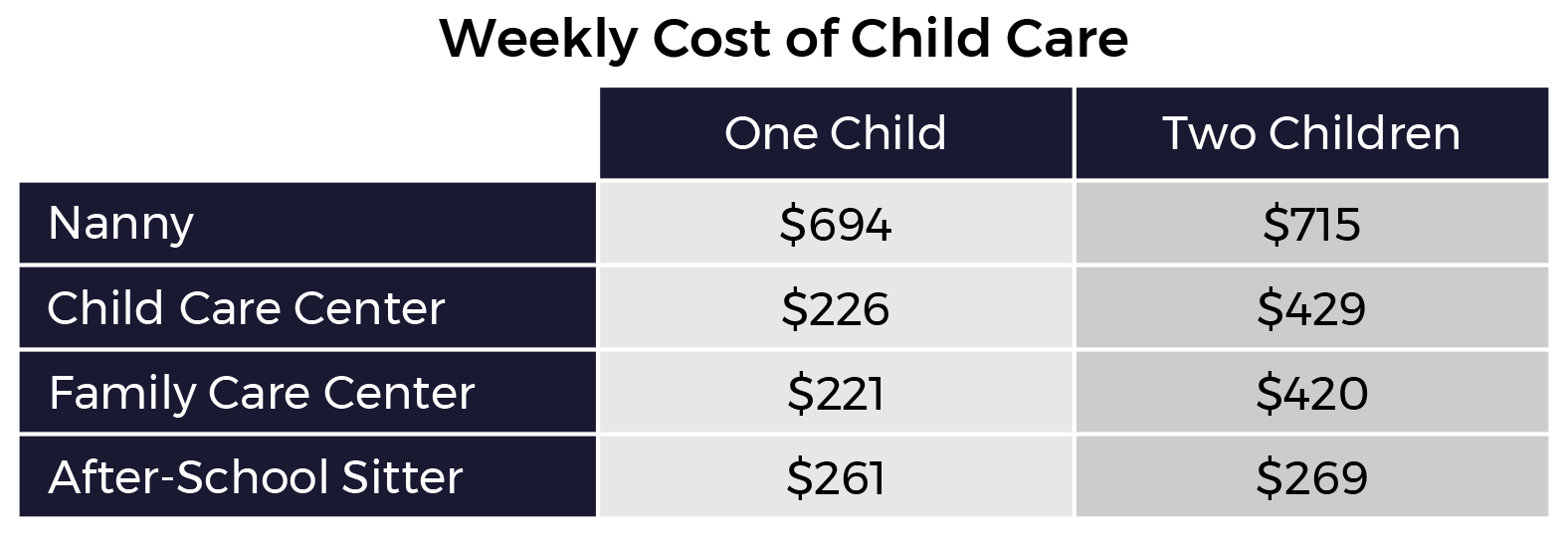Congratulations! You just found out the wonderful news that you are having your first child. You’ve celebrated with your spouse, shared the news with friends and family and have even started thinking about baby names and the colors for your new nursery. All of the sudden, a dread enters the pit of your stomach. How am I going to pay for all of this? What preparations do I need to have in place for when my new baby arrives? Will I still be able to save for retirement and cover the costs of my newborn?
According to U.S. News and World Report, the average cost to raise a child is now roughly $267,000 before reaching college.1 Add in the rising cost of college tuition and raising a child can seem overwhelming. But have no fear. With proper financial planning, the costs of raising a child can be extremely manageable, allowing you to focus on what matters most — the love and care you give to your newborn.
In this article, we’ll discuss the typical expenses you should budget for, as well as the financial preparations you will want to make prior to and immediately after the arrival of your baby.
Budgeting for your New Arrival
Formulas, strollers, diapers, clothes, toys … the costs of a child can seem endless. But how much does it really cost to raise a newborn child? There are several buckets of expenses we will look at. While some of these costs seem obvious, others can be hidden and come from expanding your lifestyle by purchasing a larger home or upgrading to that three-row minivan you’ve had your eye on. When thinking through the costs of raising your newborn, it is a great time to sit down with your significant other to discuss what you feel are the most important parts of your child’s care. This will help you to prioritize the expenses that are most important to you. You’ll also be able to identify expense items in your budget where you may be able to save on costs because they are of lesser importance to you. Lastly, get in contact with your financial advisor. They can help you think through how your new arrival will affect your expenses and ensure you remain on a solid savings path for retirement.
Housing
The top cost associated with child care is housing. Often, the arrival of a newborn means a move to a new, more spacious home or apartment. According to Consumer Expenditures Data for 2020, households spend a mean of $21,409.19 on housing expense per year.2 Census Bureau data shows median household income in the U.S. was $67,521 in 2020.3 This means that the average family spends 32% of their gross income on housing.4 Of course, many factors go into housing costs, including geographic location, home size and whether you rent or own.
Working with thousands of clients, Forum has developed a rule of thumb for home purchases: “Generally, purchases of 3x pre-tax income or below allow households to save effectively and not have many budgetary constraints. While 4x pre-tax income is doable, it does require some sacrifice to savings and budget in many situations. We’ve had a few clients go up to 5x pre-tax income. This is not advisable as in many of these situations there is very little financial flexibility left over. Many of these individuals have to stay at their job (or at least their income level) and their savings ability becomes marginal at best with very little flexibility for 10–15 years.” For more information about purchasing a home, you can read this great article from Forum on “Making Smart Decisions Around Purchasing a House.”
Child Care
Child care costs can be a significant expense and can vary dramatically when raising a child. Instead of being an explicit expense, the cost may come in the form of a reduction in income if a parent decides to stay home to raise a child.
If both parents continue to work, you can expect child care costs in the following range:

Care.com Editorial Staff, “This Is How Much Child Care Costs in 2022” Care.com, June 15, 2022.
However, this is an area where you can get creative. Perhaps you can share a nanny with a close friend or neighbor who has children of a similar age or you can rely on family for child care to help ease some of the burden.
Food Costs
Behind housing and child care, food expenses are typically the next largest expense when it comes to raising a child. The cost of food can range greatly depending on your level of thriftiness. According to the USDA, for a 1-year-old child, moderate monthly spend on food is approximately $165 a month, or approximately $1,980 per year. This grows to approximately $355 per month, or approximately $4,300 per year during the teenage years.5
Transportation
Many families will want to upgrade their vehicles to accommodate an additional child. This may mean buying a first or second car or upgrading to a larger car. The typical cost of upgrade comes to $1,947 per year.6
Other Costs
You’ll also want to account for the additional costs involved in acquiring health insurance for your new child and co-pays, clothing, diapers, toys, and any extracurriculars (e.g., Mommy and Me swim classes). You’ll also likely want to account for taking some family vacations. A financial advisor can be a great resource in helping you make key financial decisions around budgeting for the additional expenses of your new arrival.
Preparing for the Arrival of Your Newborn
Babyproofing, setting up your nursery room, deciding on the right stroller, cloth versus disposable diapers, the list of tasks and decisions you need to make can seem endless when preparing for your new child. However, there are some key financial tasks you won’t want to overlook when preparing for, and right after the birth of, your new baby.
Setting Aside an Emergency Fund
If parenting is one thing, it is unpredictable. You’ll want to be sure you have a financial safety net in place to cushion you from any unexpected expenses that may come up for your family. Typically, we recommend keeping 6 months of expenses in cash in an emergency fund at all times. For example, if your household budget after the arrival of your newborn is $8,000 a month, you will want to set aside an emergency fund of approximately $48,000.
Understand the Costs of Childbirth
Even with health insurance, the costs of childbirth can add up. Take the time to understand your health insurance benefits as it relates to childbirth, and build a budget for expenses not covered by insurance. It’s best to do this early in the pregnancy in case additional savings are needed to cover birthing expenses.
Planning for Parental Leave
How your company thinks about parental leave can have a dramatic impact on your family’s finances. Many companies offer robust maternity and paternity leave packages that you can take advantage of to spend time with your newborn. You should check with your company’s HR team and check the maternity and paternity leave policies in your state to get a better understanding of how your time off will impact your finances.
Organizing Your Baby’s Paperwork
Once your new arrival is here, there are two key pieces of paperwork you will complete while still in the hospital. The first is your child’s birth certificate, and the second is your child’s Social Security card. The hospital staff should provide you with everything you need to complete your child’s birth certificate and Social Security card. If you are having a home birth, or for some reason the staff at the hospital is unable to provide you with the necessary information, you should contact the office of vital records in your state for your child’s birth certificate and the local Social Security office for your child’s Social Security card.
Adding Your Child to Your Health Insurance Plan
You’ll want to be sure to add your child to your health insurance plan soon after discharging from the hospital. This is because you typically only have 30 days after a child is born to add them to your existing policy. You are able to backdate health insurance for your newborn, which means the care you received during childbirth and after will be covered by insurance. Check with your company’s HR team and review your policy so you know the steps you will need to take to add your child to your health insurance.
Changing Your Beneficiaries
You may want to add your new child as a beneficiary to your retirement accounts (401(k)s, IRAs, Roth IRAs, etc.), as well as your life insurance policy if you already have one. You’ll also want to update your will and estate plan, which is discussed further below. Your advisor can help you think through the accounts you will want to update and walk you through the process for updating beneficiaries.
Life Insurance
With the arrival of a newborn, you will want to make sure your family is taken care of in case something should happen to you. This is where life insurance comes into play. The birth of a child is a great time to acquire or reassess your life insurance needs.
Our perspective is that insurance should be an income replacement to provide for the family should something happen to you. A $1MM policy can be bought to provide about $40,000–$50,000 per year in cash flow if it’s needed. We use 4–5% of the policy value when thinking about how this translates into cash flow for your family. Term life makes sense for 95%+ of individuals because it is simple, portable and low cost. Remember, insurance today is always cheaper than insurance tomorrow.
Working with an insurance broker can be a great step in acquiring life insurance. This is because an insurance broker can poll several dozen insurance companies at once, finding the most competitive rate and comprehensive coverage for you. Your financial advisor is a great resource for connecting you with an experienced and trustworthy insurance broker.
Create an Estate Plan
If you haven’t already, now is the time to get a will and powers of attorney in place to ensure your loved ones will be able to easily access your estate should something happen to you. For most individuals, a simple will and powers of attorney will suffice. You can even take care of your will and powers of attorney online though sites like trustandwill.com.
If your estate is more complex, an estate lawyer can be helpful in drafting a full estate plan, which may include setting up a trust. If you already have a will, now is the time to update it to account for your new child. It’s especially important to designate guardians for your new child should something happen to you and your significant other. Your financial advisor can guide you toward the right estate plan for you and will have a network of estate attorneys should you need one.
Saving for College
Saving for college is one of the biggest concerns we see when talking to new and expectant parents. The great news is that a financial planner can provide you with savings discipline to ensure you remain on the right path and can help you explore the many types of savings vehicles for education expenses.
One of the best and most ubiquitous vehicles for college savings is a 529 plan. 529s are incredibly tax-efficient savings vehicles for those who have the means and desire to set aside money for a child’s education. The money invested in the plan grows tax-free if used for qualified education expenses (including tuition, housing, etc.). They are also incredibly flexible in that they can be used for post-graduate education and you can even change the beneficiary on the account once a year.
Additionally, many states offer tax incentives for investing in 529 plans. For instance, in New York, you can deduct up to $5,000 per individual or $10,000 per couple from your state tax return each year for contributions to a 529 plan. Our perspective is that if you have means, you are better off funding the account sooner rather than later as the compounding effects are so great.
Your financial planner can help you think through the best savings strategy for you, help you to set up your 529 plan and provide investment recommendations based on your child’s time horizon to college.
Don’t Stop Your Retirement Planning
It is so easy to put your new child’s needs above your own, especially when it comes to financial planning. It is important to remember the long-term goals you have set for yourself from a financial planning perspective and to work with your financial advisor to remain disciplined to your savings plan. Remember that by planning well for your retirement, you will be removing a huge burden for your child — that of needing to help you through your retirement years. Then you’ll be able to focus on what is really important in retirement … spoiling your future grandchildren!
Conclusion
Having your first child can seem daunting from a financial planning perspective. However, with the right planning and by working with a financial advisor, you’ll not only understand what expenses you need to prepare for, but can put a plan in place to build a wonderful financial future for you and your children.
SOURCES
1 Maryalene LaPonsie, “How Much Does It Cost to Raise a Child?” U.S. News and World Report, September 7, 2021.
2 “Consumer Expenditures in 2020,” Bureau of Labor Statistics. December 2021.
3 Emily A. Shrider, Melissa Kollar, Frances Chen and Jessica Semega, “Income and Poverty in the United States: 2020.” United States Census Bureau, September 14, 2021.
4 Tim Parker, “The Cost of Raising a Child in the United States.” Investopedia, January 9, 2022.
5 “Official USDA Food Plans: Cost of Food at Home at Three Levels, U.S. Average, March 2022.” U.S. Department of Agriculture, April 2022.
6 Elyssa Kirkham, “A Breakdown of the Cost of Raising a Child.” The Plutus Foundation, February 2, 2021.






